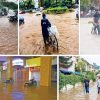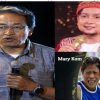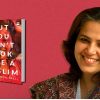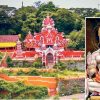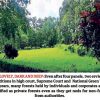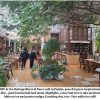Goa is abuzz with excitement as vintage bike and car owners, users, collectors and fans are decking […]
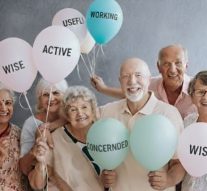
A TIME FOR ACTION, NOT JUST REFLECTION!
Body & Mind October 4, 2025By Dr. Amit Dias
Welcome to the golden years, where the wisdom is rich, the time is ample, and a forward-looking mindset is crucial. As we celebrate World Elders Day, it’s a moment not just for sentimental reflection on the past, but for a vigorous, forward-looking commitment to the future. Our elderly population—the pioneers, the storytellers, and the silent pillars of our society—deserve an India that recognizes their immense value and is ready to tackle the challenges that come with increasing longevity. This is the year we shift our focus from merely counting the years we live, to proactively adding life to those years.
This year’s observance is particularly significant, as global policy finally catches up with demographic reality, demanding a fundamental rethink of how we deliver care.
The Demographic Tsunami and the Need for Integrated Care
THE world is currently experiencing a profound demographic transition, and India is right in the thick of it. Globally, the population is aging at an unprecedented rate. It is vital for use to understand that we need to rise up to the occasion and develop services to cater to the growing needs for care. According to the World Health Organization (WHO) projections, by 2050 the number of people aged 60 years and older will double, reaching approximately 2.1 billion. In India, this shift is even more dramatic; our elderly population is projected to soar to nearly 320 million by 2050.
I had the honour to be part of the group of experts who worked in the area of integrated care of older people (ICOPE). This massive shift presents both colossal challenges and unparalleled opportunities. While it signifies a success story of improved life expectancy, it concurrently strains our existing social security and public health systems. To meet this challenge, the focus must shift to maintaining the functional ability of older persons. This is where the WHO ICOPE (Integrated Care for Older People) strategy becomes the need of the hour.
ICOPE champions a holistic approach, moving beyond merely treating disease to preserving physical and mental capacity. It involves community-level health and social services working together to address six key areas: mobility, nutrition, vision, hearing, cognitive function and depressive symptoms. Recognising this need for comprehensive care, the Indian government launched the National Programme for the Health Care of the Elderly (NPHCE) in 2010.
The NPHCE aims to provide accessible, affordable, and dedicated healthcare services to the elderly, including dedicated Geriatric OPDs and health education. Beyond healthcare, essential support is provided through various social welfare schemes. While these schemes are essential, integrating the ICOPE framework across the NPHCE will be critical to ensuring we don’t just add years to life, but keep those years healthy and independent.
A Policy Turning Point: Dementia Recognised as an NCD
CENTRALto this policy evolution is a recent, powerful decision that will fundamentally reshape global health funding and strategy. On September 25, a monumental step was taken in the global fight against dementia.
This isn’t just a headline—it’s a deeply personal vindication. Today’s landmark decision is a powerful echo of the truth I have been proclaiming all along: dementia is a major public health problem that demands our full attention. Dementia was literally in no man’s land — it was not explicitly mentioned in the disability policy, did not figure in the NCD programme and obviously didn’t have a place in the national programs for infectious disease.
With dementia projected to become the third leading cause of death globally by 2040, this recognition was long overdue. It will pave the way for critical policies and care for millions worldwide.
The significance of the UN recognizing dementia as an NCD cannot be overstated. By placing it alongside diseases like heart disease, diabetes, and cancer, the UN has mandated that governments integrate dementia prevention, diagnosis and care into their primary healthcare plans. This decision unlocks crucial access to global funding, coordinated surveillance, and forces national strategies to treat it as a legitimate public health crisis. For millions of people living with dementia in India, this means a shift from silent suffering to receiving legitimate, system-backed care, transforming a family problem into a governmental imperative.
The seniors’ secret to healthy aging…
SO, how do we, as individuals, prepare for a long and healthy life, maximizing our cognitive and physical vitality? The secret, as I often tell people, lies quite literally in the word itself: SENIORS. This blueprint gives us ownership of our aging journey:
Stay Active
Regular physical activity is non-negotiable. Exercise maintains muscle mass, improves cardiovascular health, and acts as a powerful brain tonic by releasing Brain-Derived Neurotrophic Factor (BDNF), reducing the risk of cognitive decline.
Eat Well
Fuel your body and brain with a balanced diet rich in whole grains, fresh vegetables, fruits, and lean proteins. Proper nutrition supports immune function and helps prevent chronic diseases. Essential nutrients like Omega-3 fatty acids support crucial brain health.
N – Nourish Social Connections
Social isolation is a health crisis. Engaging with family, friends, and community groups dramatically reduces loneliness and depression. Social activity is a vital form of cognitive stimulation, potentially delaying the onset of dementia.
I – Invest in Lifelong Learning
Continuous learning—be it picking up a new language, mastering a recipe, or simply staying informed—builds cognitive reserve. This reserve is your brain’s best defence, acting as a buffer against age-related memory decline.
O – Organize Your Environment
A well-structured, de-cluttered living space reduces stress and increases safety, minimizing the risk of falls. An organized environment also aids in better focus and memory retention, supporting the aging brain.
R -Rest Well
Quality sleep is vital for physical and mental health. During deep sleep, the brain actively clears toxins and consolidates memories. Maintaining a regular, restful sleep schedule is an essential preventative measure against cognitive decline.
S – Seek Help
This is perhaps the most crucial “S”. Be compliant with your medications, and recognize when to reach out for health issues or emotional support. Early intervention prevents minor health concerns from spiralling into major problems, contributing to overall quality of life.
By adhering to the SENIORS blueprint, we can take charge of our own health narrative, ensuring our senior years are defined by vitality, not frailty.
Age is not a full stop: Honouring contributors
A truly elder-friendly society is one that doesn’t just care for its seniors but actively values and utilizes their continuing contributions. We see countless examples of seniors who defy conventional expectations, proving that age is, indeed, just a number.
Consider the remarkable dedication of Rajan Narayan and Tara Narayan, the force behind the “Goan Observer.” Coming up with a high-quality, weekly publication, is an immensely challenging task, demanding relentless energy, administrative rigor and journalistic passion. Yet, they pursue this task week after week, fuelled by their profound love for Goa and their commitment to public discourse. Their work is a testament to the intellectual and professional rigor that seniors bring to the table, enriching the public sphere with experience and perspective.
Similarly, we have role models like Dr Francis Colaco. A distinguished cardiologist by profession, Dr Colaco strikes an excellent balance between his intense medical expertise and his deep commitment to the arts and society. He uses his music not just for personal enjoyment but as a medium for social commentary and community engagement. His life demonstrates that expertise is not singular; seniors can, and do, blend professional mastery, creative passion, and civic concern into a harmonious, impactful whole. These are the models of active aging we must celebrate and replicate across the nation.
The way forward:
ON this International Day for the Elders, let us move past mere platitudes. Let us brainstorm not just on how to lengthen lives, but on how to enrich them. Let the challenge before us be not merely adding years to life, but truly adding life to years. The time for meaningful action is now.
(Dr Amit Dias is a physician, researcher with a special focus on dementia prevention and healthy aging. He also holds a postgraduate diploma in geriatric medicine. He was part of the Lancet commission on prevention of Alzheimer’s disease, which published the guidelines on the prevention of dementia. Through his work, he emphasizes the importance of cognitive exercises and brain healthy lifestyle in protecting the brain.)




